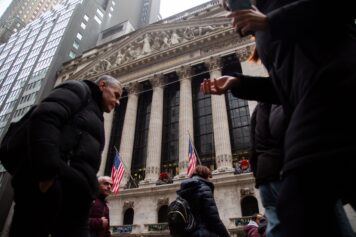By Vildana Hajric and Katie Greifeld
Investors are rushing into cash as the war in Ukraine roils markets across the globe and erodes demand for riskier assets.
As talk of Russian sanctions grew, investors poured $5 billion into U.S. money-market funds in the week ended Feb. 23, marking the first weekly inflows in a month, according to Investment Company Institute data. A similar phenomenon can be seen in cash-like instruments: Exchange-traded funds holding debt with ultra-short maturities received $2 billion in net new orders last week, Bloomberg data show.

“That’s a sign that we’re seeing a lot of negative sentiment out there,” said Emily Roland, co-chief investment strategist at John Hancock Investment Management. “Right now, it’s hard to find very many bulls.”
Sweeping financial sanctions against Russia have many investors selling stocks and high-yield corporate bonds on concern they could wind up throttling the global economic recovery. Money managers’ equity exposure fell to 44% last week, according to the National Association of Active Investment Managers — a level not seen since spring of 2020. And a recent Charles Schwab & Co. survey of retail investors found that 30% have moved into cash investments in the past three months.
Prior to the invasion, Wall Street was already dealing with the dual blow of a Federal Reserve that’s set to raise interest rates amid persistently high inflation prints. The S&P 500 fell as much as 1.6% on Monday, with the gauge down roughly 9% from its last record high. The CBOE Volatility Index and the price of gold, a safe-haven asset, gained. Meanwhile, Russia’s currency and bonds plunged as the country moved to retaliate with its own sanctions.
“Whenever there is a preponderance of geopolitical uncertainty, one of the natural instincts in a defensive fashion is to raise cash levels,” Art Hogan, chief market strategist at National Securities, said by phone.
Dark stretches tend to see defensive sectors outperform, precious metals gain, and stockpiles of cash grow, Hogan said. Cash can be redeployed later on, he added. “It represents pent-up demand for other investments down the road.”
It has not been easy for traders to predict how sanctions against Russia might reverberate or how the price of oil will behave. Volatile moves have been the one constant, with stocks staging breathtaking intraday reversals amid updates on the geopolitical situation.
At Ned Davis Research, Tim Hayes has shifted 5% of his global stocks allocation to cash in addition to upgrading his cash rating to overweight from marketweight.
Hayes, the firm’s chief investment strategist, said global breadth has deteriorated “on worries surrounding the Russia/Ukraine crisis and the impact on the oil price and global growth.” Along with some other internal models, he also cited the advance-decline line, which has fallen below the so-called “smoothing.” His recommended allocation is now 60% stocks, 25% bonds and 15% cash.
To be sure, a lot of investors point out that there’s still not a lot of great alternatives to owning equities. “Staying in cash and bonds — you’re going to lose your purchasing power,” said David Sadkin, president at Bel Air Investment Advisors.
“At current yields, cash and bonds have a negative real return so investors in those asset classes are losing ground versus inflation,” Sadkin said. He recommends long-term investors instead turn to growth assets such as public and private equities as well as real estate.
More stories like this are available on bloomberg.com.




